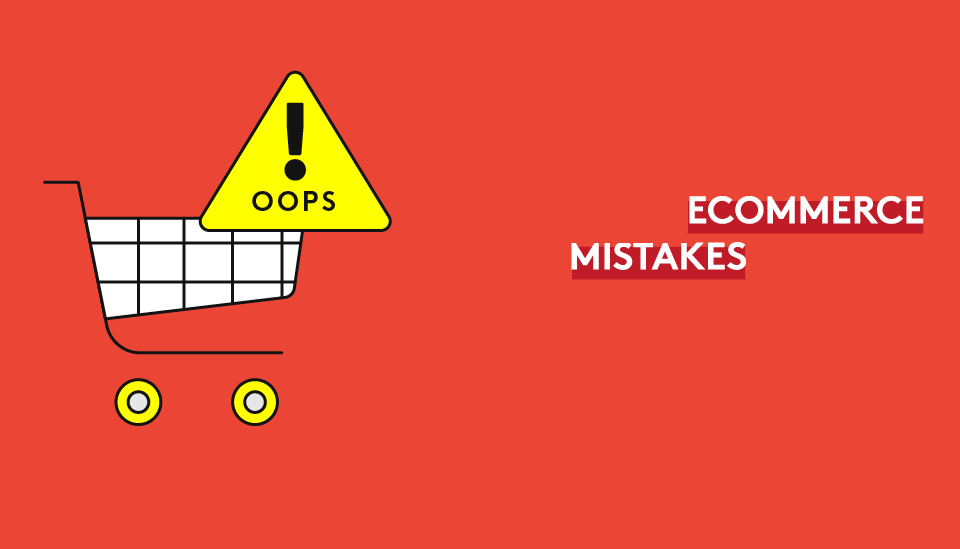6 eCommerce Marketing Mistakes to Avoid

Running an e-commerce site is not as simple as it appears. If you want to achieve your business objectives, you will need an effective marketing plan. There are several typical eCommerce Marketing blunders that new firms frequently make. It is critical to grasp these difficulties early on to increase growth and sales without limitations.
If you’re an online merchant, you’ve probably heard of Fab, an online flash sales shop that gained one million consumers in only five months after its 2010 start. However, after a few turbulent months, the firm was forced to navigate stormy seas. In 2012, it had made huge investments in a business strategy that would eventually lead to its downfall. So was this one of the eCommerce blunders?
What had occurred? Where did they make a mistake? This blog will explain where unsuccessful eCommerce firms went wrong and the lessons you may take away from their failures.
1) Your Product Descriptions Are Identical To Those Of Your Competitors.
Are you looking for product details from your vendors? If so, this might be one of the most prevalent eCommerce blunders. This is because your suppliers are most likely providing your competitors with an exact copy of your product description. As a result, it has the potential to lower the ranking of your eCommerce website. It is certainly unacceptable to search engines, which will find similar product information on multiple online stores while crawling the web. This will befuddle search engines and damage your site’s rankings.
If your product details are comparable to those of your competing companies, and these companies have higher rankings than you, it would be challenging to outperform them. Search engines, such as Google, start comparing the content on your website to that of your competitors. As a result, if your product description content is similar, but your competitors have a little more links instructing to their site, you are in serious business trouble.
You must make sure that the information on your eCommerce website is helpful to your readers. Google, as well as your customers, require valuable and unique content.
2) Duplication of Title Pages
Duplication of content, products, prototypes, and offerings are a few significant challenges in an eCommerce business setting, and errors like these will be considered eCommerce website mistakes. Every page must have a distinct page title. The title of your web page can be found at the top of the browsing window. Page titles are also displayed in search engine results directly above your URL.
The titles of your pages tell search engines and potential customers what your page is about. When numerous page titles are similar, search engines have a difficult time determining which page to suggest. As a result, they choose neither.
How are you going to fix it?
We asked many digital marketing, Dallas SEO Services, and PPC marketing service companies about the solution. Below is what they said.
- Start by looking up your page titles in your CMS to evaluate them rapidly. Then, you can change your page titles by manually modifying page tiles in your CMS.
- You could also bulk export all of your website’s pages using any tool, software application, change the page titles, and then re-import your website.
- Another way of changing page titles is to create consistency for your prospective and current page titles by utilizing a template.
3) Slow Loading Page
The time it would take for a website to load a page will be less than 2 seconds. Anything else is a waste of money and time. In addition, customers are constantly on the move. Any pause in loading a page will send them to your rival’s website. As a result, you must exercise extreme caution and keep a close eye on the performance of your website.
Many factors influence the page speed and effectiveness of your website, including network speed, cache components, content, hosting service, and so on. The most noteworthy of these variables is website design, which needs a lot of rework if not designed with loading time in mind. So, if you want to avoid making this eCommerce website blunder, ensure your web page loads faster than other pages. And, yes, Google ranks websites based on their speed.
4) Selling Incorrect Products
If your company isn’t growing as fast as you expected, look at your products first. Then, examine whether you’re selling the correct products to your customers. Business failure can occur for a variety of reasons. Failure due to selling the wrong items, on the other hand, will show up in any of the five signs.
- Offering products that do not meet the needs of the near future
- Your products/services are receiving negative feedback and ratings.
- You’re not enthusiastic about selling those items.
- The company is not adapting to the market situation.
- Your competitors frequently criticize you.
5) Product Mistiming
If you did, you’d understand that your customers are most likely eagerly anticipating your product. Then, when you launch them, you have a fantastic business opportunity for that product.
Nonetheless, if you did not conduct market research prior to launching your product. And now that you’ve launched it, you might get a negative reaction from the same audience.
Launching a product when it is least necessary will never result in great success. Product timing is thus critical for the business’s survival.
6) There Is No Powerful Brand Message Or Identity.
A brand somehow doesn’t create a product.
While Nike is best known for its shoes, they have worked hard to develop a strong brand image, logo, and message. Nike’s “swoosh” is instantly recognizable worldwide, and its strap-line “Just Do It” is easy, recognizable, and inspiring.
Don’t mistakenly believe that your products will sell themselves. To build a thriving business, you must inculcate a powerful brand identity relevant to your intended audience.
Author Bio
Lucy is an eCommerce manager who looks after the company’s website, mainly the PPC marketing, advertising, and content components. She creates and implements online marketing strategies. Lucy has a passion for running online stores and providing business consultation services.




